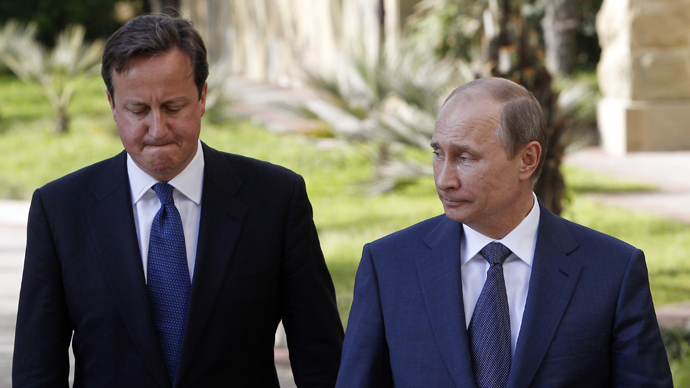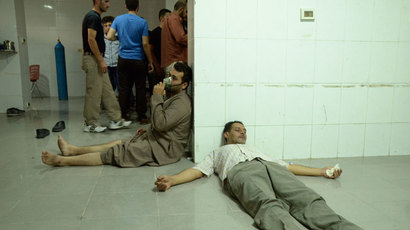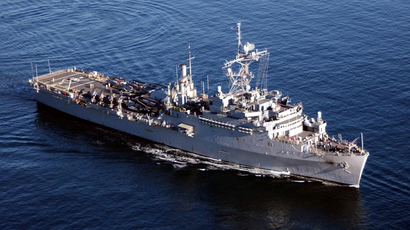Putin to Cameron: No evidence Syria chemical weapons attack took place

Russia has no evidence of whether a chemical weapons attack has taken place in Syria or who is responsible, Russian President Vladimir Putin told British Prime Minister David Cameron in a telephone call, according to Cameron’s official website.
The two leaders had an urgent phone call on Monday afternoon regarding the Syrian crisis in the wake of a sniper attack on UN chemical inspectors outside Damascus.
Following the call the British government spokesperson said: “President Putin said that they did
not have evidence of whether a chemical weapons attack had taken
place or who was responsible.”
Cameron stated that he was sure the alleged attack was instigated by the Syrian President Bashar Assad’s government forces, saying that he believed the opposition did not have the capacity to carry out such a strike.
“The regime had also prevented UN access in the immediate aftermath, suggesting they had something to hide,” he told Putin, according to the British government’s website.
Both national leaders reaffirmed the stance that all G8
attendees took in June: “No-one should use chemical weapons
and any use would merit a serious response from the international
community.”
The UN mission stated on Monday that it was still possible for the team of experts to gather necessary evidence despite the time elapsed since the alleged attack.
The alleged attack took place last Wednesday in an eastern suburb of Syria’s capital, Damascus. Between ‘dozens’ and over 1,300 people allegedly died, according to conflicting reports. NGO the Syrian Observatory for Human Rights and Doctors Without Borders (MSF) placed the figures at 322 and 355 dead respectively.
On Monday, both Russia’s Foreign Minister Sergey Lavrov and his
British counterpart, William Hague, made statements about the
alleged attack.
"The Prime Minister and President Obama… have agreed that
there should be a strong response from the international
community," Hague told BBC Radio 4's Today program.
Questioned whether military intervention was a possible route, he
said "this may be the choice." Cameron is cutting short
his holiday to return to London in order to chair a
National Security Council meeting, it emerged on
Monday.
In his turn, Lavrov stated that the fallout from the alleged
chemical attack is aimed at sabotaging discussions in Geneva
while the West tries to substitute inspectors' work with their
own statements.
“Those involved with the incident wanted to sabotage the upcoming Geneva peace talks. Maybe that was the motivation of those who created this story. The opposition obviously does not want to negotiate peacefully,” Lavrov told an urgently convened press conference in Moscow.
He mentioned that the timing of the alleged attack “suited” the opposition.
A UN mission is in the country and spent Monday taking samples from and speaking to victims of the alleged neurotoxic assault. They will continue their investigation on Tuesday, despite their car having been “deliberately shot at multiple times by unidentified snipers in the buffer zone area,” according to spokesman for the UN secretary-general, Martin Nesirky.
Syrian state TV issued a statement accusing rebel fighters of
carrying out the sniper attack, quoting sources in the Syrian
Information Ministry, while the Syrian opposition placed the
blame with the government.














